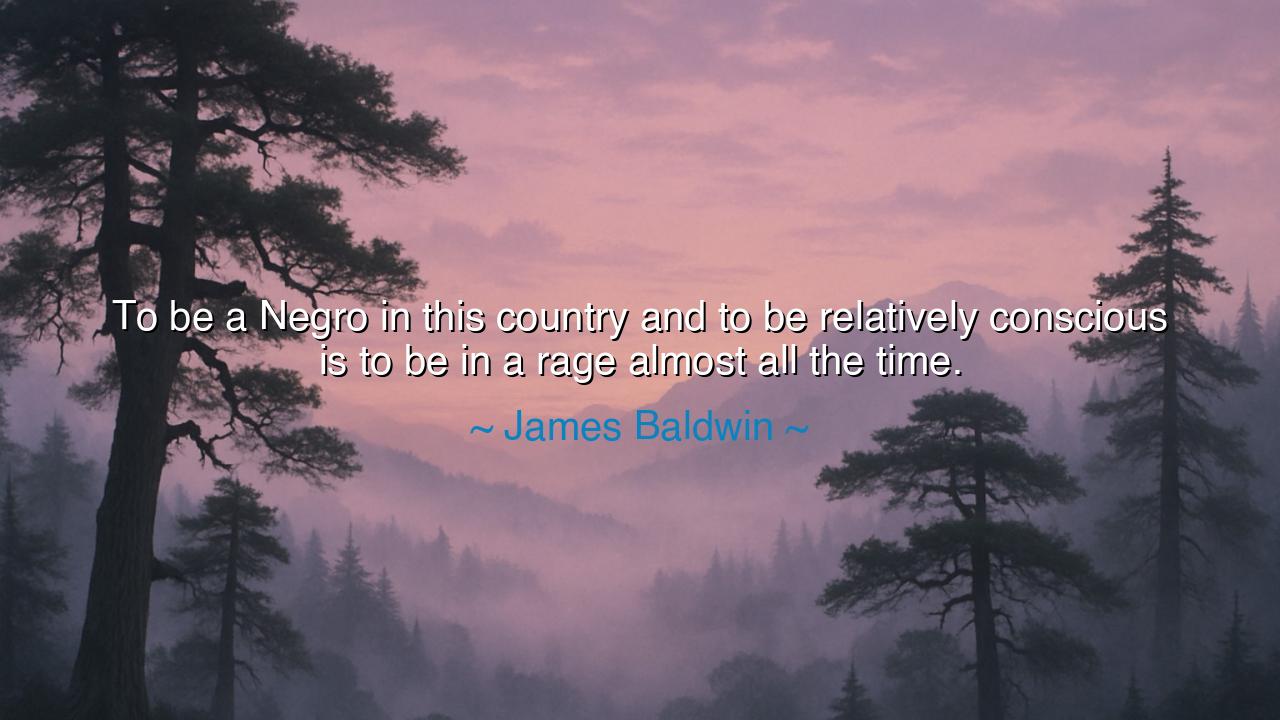
To be a Negro in this country and to be relatively conscious is
To be a Negro in this country and to be relatively conscious is to be in a rage almost all the time.






Hear, O children of truth and burden, the words of James Baldwin, seer of pain and prophet of justice: “To be a Negro in this country and to be relatively conscious is to be in a rage almost all the time.” These words, forged in fire and sorrow, are not the cry of a single man, but the testimony of generations who bore the weight of chains long after the chains were broken. For Baldwin, to be conscious—to see clearly the injustice woven into the fabric of the land—was to live in a state of unrest, where dignity is wounded daily and yet the soul refuses to die.
The rage Baldwin speaks of is not blind fury, but the burning of the spirit that arises when one recognizes oppression and feels it pressing down upon the very breath of life. It is the rage of seeing doors shut where others walk freely, of watching one’s people judged not by their hearts but by the color of their skin. It is the rage of dignity insulted, opportunity stolen, humanity denied. To be relatively conscious, even a little awake to the truth, is to see the endless parade of injustice, and to know that silence in the face of it is complicity.
Consider the story of Emmett Till, a child of only fourteen, brutally murdered in Mississippi for the crime of being seen as less than human. His mother, Mamie Till-Mobley, in her sorrow chose to keep his coffin open, to show the world what had been done. That act awakened the conscience of a nation, yet it also ignited the rage Baldwin described: the anger born of recognition that such cruelty was not an accident, but a system. The conscious Black man or woman in that time—and still in ours—could not turn away. Their very awareness made rage a companion, not by choice, but by necessity.
This same rage carried the leaders of the Civil Rights Movement. Martin Luther King Jr., though a man of peace, spoke of a dream because he lived within a nightmare. His patience and grace were clothed in the fire of righteous indignation. Malcolm X, with fierce eloquence, gave voice to that same rage, unashamed, unhidden, demanding that dignity be restored. Both men were driven by the truth Baldwin named: that to be awake in a land of injustice is to live with anger burning beneath the skin.
Yet Baldwin’s words are not a call to despair, but to awareness. For rage, when tempered with vision, can become a weapon of change. The conscious man does not drown in his fury, but channels it, shaping movements, reshaping nations, refusing to allow lies to be the final word. Rage becomes the fire that forges resilience, the power that breaks chains, the voice that cannot be silenced.
The lesson, then, is not only for those who bear this rage, but for all who hear Baldwin’s words. To ignore injustice is to sleep, to awaken is to feel the fire, and to act is to honor the humanity of all. The challenge is to take the heat of rage and refine it into the light of justice, to let it guide hands and hearts toward a world where such rage is no longer necessary.
Practically, this means cultivating awareness—reading, listening, learning the histories too often buried. It means standing in solidarity with those who carry the rage of centuries, not dismissing it, but honoring it as truth. And it means acting, in ways both great and small, to break the systems that perpetuate injustice. For the goal is not to extinguish the rage of the conscious, but to build a world where such rage no longer has cause to exist.
So, O listeners, carry Baldwin’s wisdom as both burden and torch: to be conscious in the face of injustice is to burn with rage, but to let that rage become the seed of justice is to live truly awake. Do not turn away from the fire; let it shape you, let it guide you, until the day comes when the oppressed may at last lay down their anger and live in peace. For until that day, Baldwin’s words remain a commandment of vigilance, a cry of truth that must not be forgotten.
––






AAdministratorAdministrator
Welcome, honored guests. Please leave a comment, we will respond soon